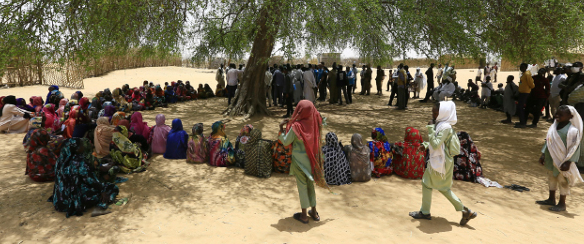With 4262 studies, Sub-Saharan Africa (SSA) accounts for the largest number of impact evaluations in the Development Evidence Portal (DEP). The second blog in our 'state of the evidence' series that previously featured Latin America and the Caribbean unpacks the evidence coming from this part of the African continent. The DEP – which remains a global public good – allows us to analyze which countries, interventions and outcomes are the most researched, by whom and in what way.
Substantial increase in impact evaluations 2010 onwards
We begin by exploring publications over time. We see a slight upward trend between 2000 and 2009 with a substantial increase from 2010 – a sharp rise 2015 onwards peaking in 2019 with over 500 IEs published then. There is a slight dip in subsequent years, which could be a consequence of COVID-19 limiting primary data collection. It is worth noting that data is represented only up to 2021 following which the DEP does not have updated evidence on health studies.
Figure Number of impact evaluation studies in SSA between 1990 and 2021

Distribution across countries, concentration in East Africa
While studies in SSA region are distributed across countries, East Africa accounts for more than 25% of them. Kenya, Uganda and Ethiopia are the top three countries where impact evaluations are conducted. Aside from Democratic Republic of Congo, there seems to be an overall low number of studies in central Africa. A possible reason for this is the historical unrest within the region which often makes it difficult to conduct evaluations. The map below provides an overview of the number of evaluations in the region.

Of the 48 countries in the region, eight countries have more than 200 IEs, three with more than 100, five with more than 50 with the remainder of countries ranging between one and 47 with quite some variability between.
Large proportion of authors from US-based institutions
As part of the DEP, we also collect data on the authors' countries based on their affiliations. Consistent with the overall DEP data—which includes all sectors—we find that authors based in the United States dominate, representing almost a third of lead authors. They are followed by authors from the United Kingdom, South Africa, Kenya, and Ethiopia. It is worth noting that these findings underscore the importance of fostering increased involvement or leadership from authors in Sub-Saharan Africa.

Studies evaluating health interventions dominate this region too
Similar to the trend identified in the Latin America and the Caribbean region, in SSA we see health being the dominant World Bank sector. Almost half of the IEs within the region evaluate health interventions. There seems to be a more specific focus on two areas, namely sexual health and nutrition. Other prominent sectors evaluated are agriculture, fishing and forestry and social protection – which together account for a third of studies in the SSA region. Public administration, financial sector, water, sanitation, and waste management industry, trade, and services all have more than 100 studies with the remaining sectors like energy and extractives, information and communications having relatively smaller evidence bases (less than 50 studies).

Looking at the overall trend of sectors, although there is a concentration in health, we see an upward trend for most sectors particularly 2009 onwards with the exception of transportation and information and communication technologies – as these started to pick up more recently from 2018.

USAID leads the funding for evidence in SSA
When we look at who is commissioning the studies, we find four SSA governments among the top 10 funders. The United States Agency for International Development (USAID) has funded the most number of impact evaluations followed by the World Bank Group, Bill & Melinda Gates Foundation, National Institutes of Health (NIH) and United Kingdom foreign agencies, which have provided funding for a similar number of projects.

Unconditional cash transfers are the most evaluated intervention
Among the types of interventions studied, we see that the top five interventions have more than 100 evaluations. The most evaluated intervention in SSA is unconditional cash transfers (UCTs) with the remaining four evenly split between nutrition and agricultural interventions. UCTs are mostly found in East and Southern African countries. Aside from the top five there is a very diverse portfolio of interventions evaluated across SSA aligned with the sector coding. A significant proportion of the interventions comprise multiple components which perhaps suggests that interventions are aiming to address problems that are complex and may have multiple contributing factors.

Growing evidence base
In the vibrant landscape of development programming across Sub-Saharan Africa, a surge in impact evaluations studies, notably in health, signals a growing commitment to evidence-based solutions. There seems to be a regional concentration in East Africa, with Kenya, Uganda, and Ethiopia at the forefront. Beyond health, diverse sectors are emerging, hinting at an evolving evidence base with broader interests across various topics. The prominence of authors from the United States and the United Kingdom, as well as international organizations indicates a global interest in SSA. Government and international aid agencies play pivotal roles as funders, underlining the collaborative efforts within the region. As the SSA evidence base grows, it paints a picture of adaptability and innovation. This dynamic scenario calls for ongoing exploration, encouraging a deeper understanding of the complex and multifaceted challenges faced by the region.




